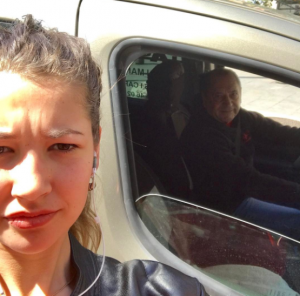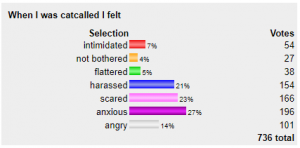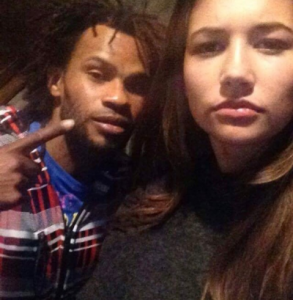Woman Took 23 Selfies with Catcallers to Prove Biggest Problem with Catcalling

A student from the Netherlands has been posting selfies with pretty much all the men who have been catcalling her during the past couple of weeks. Noa Jansma, 20 years old, pulls a deadpan expression as she is situated in the corner of the pictures with men across many age ranges and ethnicities. She posts the pictures on her instagram @dearatcallers to prove one of the major problems with catcalling. We conducted our own “catcalling” poll and some interviews to investigate the phenomenon (this article is not a scientific study, we merely wanted to gauge our audience’s thoughts on the matter, for some numbers on how many women experience this click here, or here).
“I always ask them before I take the picture,” says Jansma in an interview, “but as far as I can remember hardly anyone has rejected that request so far.”
“If I walk on, it feels wrong that they get away with it without any consequences.” Jansma started the account “to create awareness about the objectification of women in their daily life.” She also stated that her being the initiator and “[me] standing in front of the catcallers,” is hopefully a “reversed power ratio” compared to the normal situation.

The catcalling pictures are often accompanied by a short description of the incident, ranging from things like “Giiiirl!!” to “[after following me around for 10 minutes straight] ‘sexy girl where are you going? Can I come with you?”
You might also like this quiz: “What is your mental age?”
Jansma is aware of the situation she put herself in by entering into a conversation with the catcaller. “It didn’t always go smoothly. Many men thought it was funny because I was a ‘fiery girl’, once I was surrounded by a group and intimidated even further.” That must have been pretty frightening.
Catcalling and you
We asked some Psych2go readers about their experiences. “I had some experiences with it as well. I’ve been hollered at from a car, then cussed because I ignored them. I’ve also had a phone thrown into my lap by a drunk man trying to touch my legs as he breathed alcohol fumes onto me while slurringly asking for my number. I was so scared he would turn violent,” says reader Macy E. Other readers seem to have had similar feelings. 50% of our poll responders reported feeling either “scared” or “anxious” when catcalled. Only 9% reported being “not bothered” or “flattered”.

results at the time of publishing this article
As you can see when you scroll through Jansma’s pictures, the men are almost always smiling. Jansma says this surprised her at first. “They’re happy because they actually think they’re complimenting me. They really don’t seem to feel as if they have done anything wrong.” This is kind of astonishing; the men really do not seem to realize that this verbal intimidation feels uncomfortable. “Many of them even put their arm around me as if they actually know me. They almost seemed proud of it.”
The Catcalling Problem?
The ‘compliment’ excuse is one of the biggest problems with catcalling, and sadly a frequently used defense. A lot of men think, or say they think, they’re paying someone a compliment, but do not seem to realize that the way in which they do this is far from a normal way people give a compliment.
What’s also a big problem is that not only grown up women face this, but also 13 year olds. In our poll 71% said they felt either “harassed”, “anxious” or “scared” when catcalled.
“Many people still don’t know how often and in whatever context ‘catcalling’ happens,” Noa says. This seems very plausible. When we interviewed some of our readers about their experiences, most of them stated that whenever they told people about it, often male friends or relatives don’t seem to fully understand why it’s uncomfortable.
But here’s a simple illustration to show the difference between a possible compliment and catcalling. Imagine someone walking up to you in a café telling you “Hey, I think you’re beautiful” and then leaving you (respectfully) alone. This is very different from the average situation women go through when being catcalled, which tends to be more sexually tinted, and more verbally loud or physically intimidating.
But it doesn’t only happen to women though. “I’m a bi guy and it’s happened to me on multiple occasions. Usually I’m not super bothered, but it’s happened that they followed me around. That was scary.”
“It’s usually somewhere on the street, when you’re minding your own business, when someone yells at you about how you look. This often includes some vulgar explicit comment about body parts and what they’d like to do to you. It’s usually more a power game than anything compliment related, I think. Even when I started presenting as non-binary, as that is how I identify, it never really stopped,” says reader Jo.
Another of our readers said “the ‘Ugh the learn to take a compliment’-excuse is infuriating. Following me in your car at walking speed for two streets and then asking ‘hey where are you going with that ass? Want to have a good time in my car?’ is NOT a compliment. It’s creepy and rude.”

Not about me
As soon as the account was set up, Jansma invited people to share their own #dearcatcallers moment, and once her month of selfies has ended she’s aiming to hand the account over to different people around the world. This is to prove that it’s not just a problem in one country.
“I’m not the subject, the subject is catcalling. To show that “the project is not all about me”, says Jansma, “I want to expand the project to include more women all around the world.”

And another reader, Shalyssa, said: “Shouting from across the street about how some of my body parts – my ‘ass and tits’ as you so eloquently put it – appeal to you while I’m walking around with colleagues (and superiors!) during my break, is definitely not the way to pay someone a compliment.”
How can something that makes 71% of our poll respondents feel either “harassed”, “scared” or “anxious”, be a nice compliment? Catcalling often makes people feel unsafe in a space that should be public and safe.
So, #dearcatcallers, if you truly mean to convey a compliment, there are far more appropriate ways to do that. Ways that are not creepy and lecherous most of the time. It’s also an option to just respect people’s personal space and experience, and be quiet.
We at psych2go want to know if you have ever experienced catcalling?
Disclaimer: this article is in no way intended to imply that all men do this. Articles strongly suggest/It’s shown that catcalling mostly concerns men yelling at women. (more sources from specialized street harassment research)
You might also like this quiz: “What is your mental age?”










I have been cat called a few times, it was never pleasant.